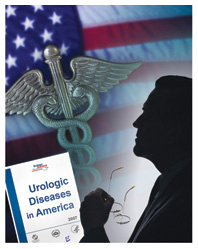Urologic Diseases Research Updates
Winter 2007
NIDDK Releases Comprehensive Report on Urologic Diseases
 The National Institute of Diabetes and Digestive and Kidney Diseases (NIDDK) has released a groundbreaking comprehensive analysis of urologic diseases in America in an ambitious effort to quantify the burden of these diseases on the U.S. economy and public. The National Institute of Diabetes and Digestive and Kidney Diseases (NIDDK) has released a groundbreaking comprehensive analysis of urologic diseases in America in an ambitious effort to quantify the burden of these diseases on the U.S. economy and public.
Americans spend nearly $11 billion annually—exclusive of medication expenditures—on medical care for urologic diseases, including visits to office-based physicians and hospital outpatient clinics, visits to emergency rooms, and hospital stays, according to Urologic Diseases in America 2007, a 700-page report that is the culmination of 5 years of work by the NIDDK, RAND Health, and the University of California, Los Angeles (UCLA).
The report incorporates current and retrospective data on all aspects of the epidemiology, practice patterns, costs, and impact of urologic diseases in the United States and is intended for use by public officials, nongovernment organizations, the media, academic researchers, health professionals,
and the public.
Most Important Effort
“Accurately describing the burden of urologic disease on the American public is one of the most important efforts undertaken by the NIDDK at the dawn of the new millennium,” said the report’s authors, Mark S. Litwin, M.D., M.P.H., and Christopher S. Saigal, M.D., M.P.H., professors at UCLA’s David Geffen School of Medicine and researchers at UCLA’s Jonsson Comprehensive Cancer Center. “Documenting trends in epidemiology, practice patterns, resource utilization, technology diffusion, and costs for urologic disease has broad implications for quality of health care, access to care, and the equitable allocation of scarce resources, both in terms of medical services and research budgets.”
The report incorporated information from three data categories: Medicare data, derived from the Centers for Medicare and Medicaid Services; utilization, cost, and prevalence data, extracted from the Agency for Healthcare Research and Quality and the National Center for Health Statistics; and data on special populations and topics of interest, culled from various organizations including the Veterans Health Administration. The report noted that for many urologic conditions, population-based datasets had limited information on true prevalence.
Conditions Analyzed
The extensive report covers definitions, risk factors, prevalence and incidence, utilization trends, economic impact, and recommendations on the following conditions:
Prostate
- Prostatitis
- Benign prostatic hyperplasia
- Prostate cancer
Bladder
- Interstitial cystitis and painful bladder syndrome
- Urinary incontinence
- Adult male and female bladder cancer
- Upper and lower tract transitional cell carcinoma
Kidney
- Urolithiasis
- Ureteropelvic junction obstruction
- Kidney cancer
Pediatric
- Vesicoureteral reflux
- Undescended testis
- Hypospadias
- Ureterocele
- Posterior urethral valves
- Urinary incontinence and urinary tract infection in children
Male Health
- Male infertility
- Erectile dysfunction and Peyronie’s disease
- Urethral stricture
- Testicular cancer
Infections
- Urinary tract infection
- Adult male and female
- Sexually transmitted diseases
You can find a report compendium or download the full report at http://kidney.niddk.nih.gov/statistics/uda. You also can order the report in book form for $10 or on CD-ROM for $5 at www.catalog.niddk.nih.gov/materials.cfm?CH=NKUDIC.
UDA Project Publishes Key Findings
Key findings from the Urologic Diseases in America 2007 (UDA) project that were published in several academic journals include the following:
Gender, age, race, and socioeconomic status influence the type of bladder reconstruction a person with bladder cancer receives; younger men are more likely to get the most sophisticated types of reconstruction. These findings appeared in a July 2006 issue of the journal Cancer. The lifetime risk for urinary tract infections (UTIs) in women is greater than 50 percent. Between 1988 and 1994, the overall lifetime prevalence of UTIs was estimated to be 53,067 per 100,000 women. Composite data revealed that overall spending for treating UTIs in U.S. adult women, excluding spending on outpatient prescriptions, was about $2.5 billion in 2000. Findings were published in an April 2005 issue of the Journal of Urology. Treatment of men with benign prostatic hyperplasia (BPH) puts a significant burden on employees and their employers through direct medical costs and lost work time. Direct and indirect private sector costs related to BPH treatment are an estimated $3.9 billion. These findings also were published
in the April 2005 issue of the Journal of Urology. Data from the 2001 to 2002 National Health and Nutrition Examination Survey showed that Hispanic/Latino men were about twice as likely as Caucasian men to report erectile dysfunction (ED) after controlling for risk factors other than race known to be associated with ED, including diabetes,
obesity, and hypertension. The report also found the prevalence of ED increased dramatically with advanced age—three quarters of men age 75 and older report some level of ED. The findings appeared in the January 2006 issue of the Archives of Internal Medicine.
NIH Publication No. 07–5743
March 2007
[Top]
|






